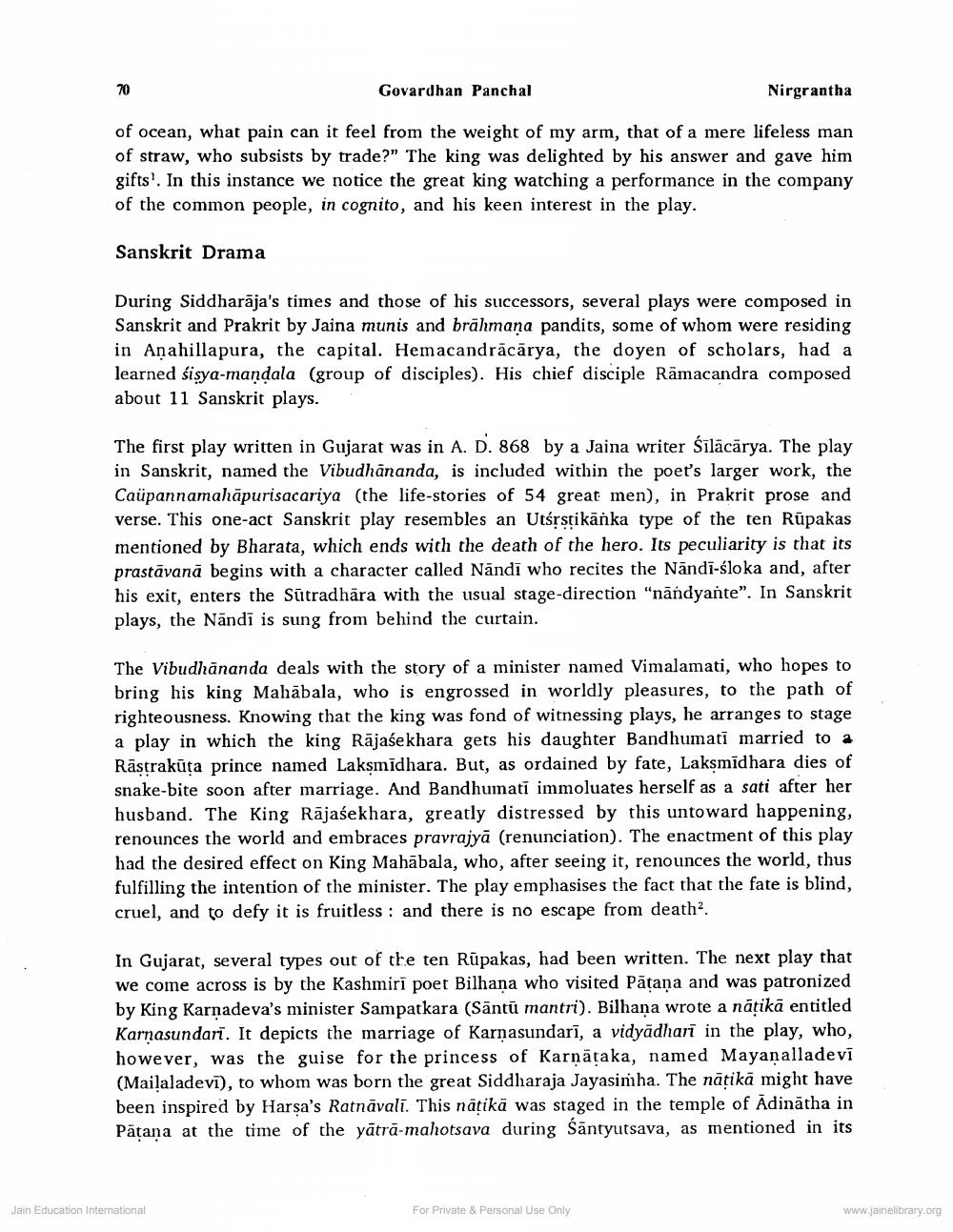________________
Govardhan Panchal
Nirgrantha
of ocean, what pain can it feel from the weight of my arm, that of a mere lifeless man of straw, who subsists by trade?" The king was delighted by his answer and gave him gifts!. In this instance we notice the great king watching a performance in the company of the common people, in cognito, and his keen interest in the play.
Sanskrit Drama
During Siddharāja's times and those of his successors, several plays were composed in Sanskrit and Prakrit by Jaina munis and brāhmana pandits, some of whom were residing in Anahillapura, the capital. Hemacandrācārya, the doyen of scholars, had a learned śisya-mandala (group of disciples). His chief disciple Ramacandra composed about 11 Sanskrit plays.
The first play written in Gujarat was in A. D. 868 by a Jaina writer śilācārya. The play in Sanskrit, named the Vibudhānanda, is included within the poet's larger work, the Caüpannamahāpurisacariya (the life-stories of 54 great men), in Prakrit prose and verse. This one-act Sanskrit play resembles an Utśrstikānka type of the ten Rūpakas mentioned by Bharata, which ends with the death of the hero. Its peculiarity is that its prastāvanā begins with a character called Nandi who recites the Nandi-śloka and, after his exit, enters the Sūtradhāra with the usual stage-direction "nandyante". In Sanskrit plays, the Nāndi is sung from behind the curtain.
The Vibudhānanda deals with the story of a minister named Vimalamati, who hopes to bring his king Mahābala, who is engrossed in worldly pleasures, to the path of righteousness. Knowing that the king was fond of witnessing plays, he arranges to stage a play in which the king Rājasekhara gets his daughter Bandhumati married to a Rästrakūta prince named Lakşmidhara. But, as ordained by fate, Laksmīdhara dies of snake bite soon after marriage. And Bandhumati immoluates herself as a sati after her husband. The King Rajasekhara, greatly distressed by this untoward happening, renounces the world and embraces pravrajyā (renunciation). The enactment of this play had the desired effect on King Mahābala, who, after seeing it, renounces the world, thus fulfilling the intention of the minister. The play emphasises the fact that the fate is blind, cruel, and to defy it is fruitless : and there is no escape from death.
In Gujarat, several types out of the ten Rūpakas, had been written. The next play that we come across is by the Kashmiri poet Bilhana who visited Patana and was patronized by King Karnadeva's minister Sampatkara (Santū mantri). Bilhana wrote a nātikā entitled Karnasundari. It depicts the marriage of Karnasundarī, a vidyādharī in the play, who, however, was the guise for the princess of Karnataka, named Mayanalladevi (Mailaladevi), to whom was born the great Siddharaja Jayasimha. The nātikā might have been inspired by Harsa's Ratnāvali. This nātikā was staged in the temple of Adinātha in Patana at the time of the yātrā-mahotsava during Sāntyutsava, as mentioned in its
Jain Education International
For Private & Personal Use Only
www.jainelibrary.org




